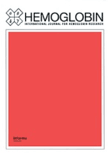
HEMOGLOBIN
Scope & Guideline
Fostering collaboration in blood research and beyond.
Introduction
Aims and Scopes
- Genetic and Molecular Characterization of Hemoglobin Variants:
The journal publishes studies that explore the genetic basis of various hemoglobinopathies, including sickle cell disease and thalassemia, focusing on novel mutations and their implications for disease phenotype. - Clinical Management and Treatment Approaches:
Research on clinical practices, treatment efficacy, and management strategies for patients with hemoglobin disorders is a key focus, including studies on iron chelation therapy, hydroxyurea, and stem cell transplantation. - Public Health and Screening Initiatives:
The journal emphasizes public health strategies for screening and managing hemoglobin disorders, particularly in high-prevalence regions, aiming to reduce the burden of these diseases through early detection. - Innovative Therapeutic Strategies:
It highlights advancements in gene therapy, targeted treatments, and novel drug development aimed at improving patient outcomes for those suffering from hemoglobinopathies. - Epidemiological Studies and Risk Factors:
The journal frequently publishes epidemiological research that assesses the prevalence, risk factors, and comorbidities associated with hemoglobin disorders across different populations.
Trending and Emerging
- Gene Therapy and Precision Medicine:
There is a notable increase in studies focusing on gene therapy as a treatment for hemoglobin disorders, highlighting its potential to address the underlying genetic causes of diseases like sickle cell anemia and thalassemia. - Utilization of Next-Generation Sequencing:
The application of next-generation sequencing techniques to identify novel mutations and understand the genetic basis of hemoglobinopathies is becoming increasingly prominent in recent studies. - Impact of COVID-19 on Hemoglobin Disorders:
Research exploring the effects of COVID-19 on patients with hemoglobin disorders, including changes in disease management and outcomes, is an emerging area of interest. - Quality of Life and Psychosocial Factors:
There is a growing emphasis on studies that assess the quality of life and psychosocial factors affecting patients with hemoglobinopathies, reflecting a broader understanding of patient care. - Novel Therapeutic Agents and Combination Therapies:
Research into new therapeutic agents and combination treatments, particularly focusing on improving outcomes for patients with severe forms of hemoglobin diseases, is gaining momentum.
Declining or Waning
- Historical Perspectives on Thalassemia:
Research focusing on historical accounts or retrospective studies of thalassemia has seen a decline, possibly due to a shift towards more contemporary clinical trials and genetic studies. - Basic Hematological Studies:
Papers that primarily report basic hematological parameters without a direct link to clinical outcomes or genetic insights seem to be less frequent, as the field moves towards more applied research. - Global Comparisons of Thalassemia Management:
While still relevant, comparative studies between different countries regarding thalassemia management strategies have become less common, likely as institutions focus more on localized and personalized medicine approaches. - Older Diagnostic Techniques:
The use of older diagnostic methods, such as simple electrophoresis without advanced sequencing, appears to be waning as new technologies like next-generation sequencing gain prominence. - General Reviews without Novel Insights:
The publication of general reviews that do not provide novel insights or applications related to hemoglobinopathies is declining, as the journal favors studies that contribute new knowledge or advancements in treatment.
Similar Journals
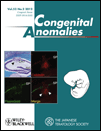
CONGENITAL ANOMALIES
Fostering understanding of embryological challenges.CONGENITAL ANOMALIES is a notable journal published by WILEY, dedicated to advancing the understanding of congenital disorders and anomalies through high-quality research and clinical insights. With an ISSN of 0914-3505 and an E-ISSN of 1741-4520, this journal has been a key resource for professionals in the fields of pediatrics, embryology, and developmental biology since its inception in 1973, although coverage discontinued in Scopus after 2019 due to evolving standards in publication. The journal is ranked in the 48th percentile in the domain of pediatrics, as well as in the 26th and 14th percentiles respectively for embryology and developmental biology, placing it among respected publications in its category. Although it does not currently offer open access options, its contributions remain vital for researchers, healthcare professionals, and students seeking up-to-date information on congenital anomalies, their origins, and potential interventions. With a commitment to fostering knowledge in this critical area of health science, CONGENITAL ANOMALIES continues to play an important role in the intersection of scientific research and clinical practice.
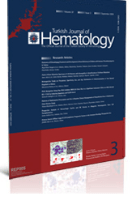
Turkish Journal of Hematology
Empowering the global hematology community through open access.Turkish Journal of Hematology is an esteemed publication dedicated to advancing the field of hematology, producing influential research since its inception in 1999 under the auspices of GALENOS PUBL HOUSE. With an Open Access model, it facilitates widespread dissemination of knowledge, allowing researchers, clinicians, and students to stay abreast of the latest developments in blood disorders and treatments. With an ISSN of 1300-7777 and an E-ISSN of 1308-5263, the journal holds a commendable position in the academic community, evidenced by its 2023 Q3 ranking within the hematology category and its standing at #80 out of 137 in the Scopus database, placing it in the 41st percentile. Covering a wide scope of topics within hematology, this journal serves as a critical resource for disseminating innovative research and clinical practices pertinent to the ongoing challenges faced in this vital area of medicine. With its continuous publication until 2024, Turkish Journal of Hematology remains a beacon for enhancing the understanding and treatment of hematological conditions within the Turkish and global medical communities.
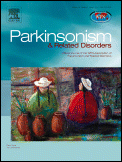
PARKINSONISM & RELATED DISORDERS
Innovating care for Parkinson's and beyond.PARKINSONISM & RELATED DISORDERS, published by Elsevier Science Ltd, is a prominent peer-reviewed journal dedicated to advancing the understanding of Parkinson's disease and related neurodegenerative disorders. With an impact factor placing it in the Q2 category across multiple fields including Geriatrics and Gerontology and Neurology for 2023, this journal serves as a crucial platform for researchers, healthcare professionals, and students alike. Covering an array of topics from clinical trials to innovative therapeutic strategies, it aims to disseminate valuable insights that can improve patient care and outcomes. While it remains a subscription-based journal, its relevance is underscored by its consistent rankings in Scopus, where it ranks 105th in Clinical Neurology and 35th in Geriatrics and Gerontology. Authored by top scholars in the field, PARKINSONISM & RELATED DISORDERS continues to contribute significantly to the body of knowledge surrounding these debilitating conditions, facilitating the exchange of cutting-edge research and fostering collaboration within the scientific community.
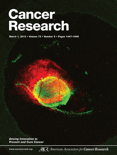
CANCER RESEARCH
Elevating the standards of cancer research and innovation.Cancer Research, published by the American Association for Cancer Research, is a premier journal in the field of oncology, renowned for its commitment to advancing cancer research since its inception in 1941. With an impressive impact factor reflecting its vital role in the field, this journal consistently ranks in the Q1 quartile for both Cancer Research and Oncology, positioning it among the top 7.5% of journals in these categories. The journal serves as a crucial platform for researchers, professionals, and students to disseminate and gain insights into groundbreaking studies that shape our understanding of cancer biology, prevention, diagnosis, and treatment. While it is not an open-access publication, its rigorous peer-review process ensures that only high-quality research is published, thus maintaining a standard of excellence in the scientific community. With a strong legacy and an ever-expanding influence, Cancer Research continues to be essential for anyone dedicated to the fight against cancer, showcasing cutting-edge research that drives scientific discovery and innovation.
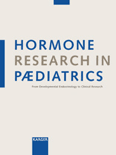
Hormone Research in Paediatrics
Unlocking the secrets of hormones in children's health.Hormone Research in Paediatrics, published by KARGER, is a leading international journal dedicated to advancing the field of pediatric endocrinology. With its ISSN 1663-2818 and E-ISSN 1663-2826, it serves as a vital resource for researchers and professionals focused on the hormonal aspects affecting children's health. Housed in Switzerland, the journal benefits from a strong academic reputation and ranks in the prestigious Q1 category in Pediatrics, Perinatology, and Child Health, as well as maintaining Q2 status in Endocrinology, Diabetes, and Metabolism. Covering a time span from its inception in 1970 to the present day, Hormone Research in Paediatrics is committed to publishing high-quality original research, reviews, and clinical studies, making crucial contributions to our understanding of pediatric hormonal disorders and treatments. The journal incorporates open access options, fostering wider dissemination and accessibility of vital research findings, thus ensuring that significant advancements reach academics, professionals, and students globally.

Cancer Reports
Connecting researchers and clinicians for impactful change.Cancer Reports, published by WILEY, is an esteemed open-access journal dedicated to the field of oncology and cancer research. With a focus on disseminating impactful research findings since its transition to fully open access in 2021, Cancer Reports aims to facilitate knowledge sharing among researchers, clinicians, and healthcare professionals globally. The journal is positioned within the Q3 quartile for both Cancer Research and Oncology categories as of 2023, reflecting its commitment to quality and relevance in a competitive publishing landscape. With an ISSN of N/A and an E-ISSN of 2573-8348, the journal showcases studies across diverse aspects of cancer biology, treatment modalities, and patient care strategies. Located in the United Kingdom at 111 River St, Hoboken 07030-5774, NJ, Cancer Reports strives to contribute to the advancement of cancer research and improve health outcomes for patients worldwide, making it a pivotal platform for scholars and practitioners in the oncology community.
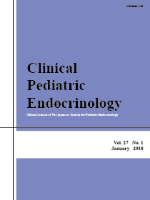
Clinical Pediatric Endocrinology
Advancing pediatric health through innovative endocrine research.Clinical Pediatric Endocrinology is a prestigious journal dedicated to advancing the field of pediatric endocrinology, published by the Japanese Society of Pediatric Endocrinology. With a respectable ISSN 0918-5739 and E-ISSN 1347-7358, this journal serves as a critical platform for innovative research spanning various aspects of endocrine disorders in children, including diabetes and metabolic conditions. Although it does not currently offer open access, it remains highly relevant in its category, being ranked in Q4 and Q3 tiers across multiple specialties as of 2023. With a publication history that spans from 1992 to 2024, this journal has contributed significantly to the literature, as evidenced by its inclusion in prominent databases. It invites submissions from researchers and practitioners worldwide, aiming to facilitate knowledge sharing and improve clinical practices in pediatric endocrinology. For those dedicated to enhancing care outcomes in children with endocrine disorders, Clinical Pediatric Endocrinology provides essential insights and fosters a community of engaged professionals.
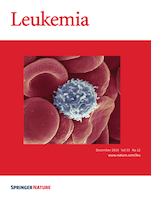
LEUKEMIA
Bridging Science and Practice in HematologyLEUKEMIA, published by SpringerNature, is a premier journal in the field of hematology and oncology, with ISSN 0887-6924 and E-ISSN 1476-5551. Established in 1987, this esteemed publication serves as a critical platform for disseminating groundbreaking research and comprehensive reviews on the pathophysiology, diagnosis, and treatment of leukemia and related hematological disorders. With a distinguished impact, it holds a top-tier status in several categories, including Q1 rankings in Anesthesiology and Pain Medicine, Cancer Research, Hematology, and Oncology for 2023. The journal is globally recognized for its rigorous peer-review process and is highly regarded among academia, evidenced by its impressive Scopus rankings—7th in Hematology and 24th in Oncology. Researchers, clinicians, and students alike will benefit from the rich content that this journal offers, making it an invaluable resource in the fight against leukemia. The main objective of LEUKEMIA is to advance knowledge and encourage further innovations within the field, ensuring that vital insights reach practitioners and researchers around the world.

INTERNATIONAL JOURNAL OF HEMATOLOGY
Connecting Scholars in the Pursuit of Blood KnowledgeThe INTERNATIONAL JOURNAL OF HEMATOLOGY, published by SPRINGER JAPAN KK, serves as a critical platform for advancing research in the field of hematology. With a prestigious history spanning over three decades from 1991 to 2024, this journal is recognized for its impactful contributions, evidenced by its Q2 category ranking in Hematology for 2023, and its notable position at rank #71 out of 137 in the Scopus Medicine Hematology category. Researchers and professionals within the hematology community benefit from the journal's rigorous peer-reviewed articles that cover a wide range of topics, including clinical studies, basic research, and novel therapeutic strategies. Though currently non-open access, it provides essential insights and findings to an audience passionate about the latest advancements in blood disorders and treatments. Situated in Japan, the journal not only showcases high-quality research but also fosters a global exchange of knowledge in hematology, making it a significant resource for scholars, practitioners, and students alike.

Journal of Translational Medicine
Advancing Healthcare through Translational Insights.Journal of Translational Medicine, published by BMC in the United Kingdom, stands at the forefront of biomedical research, bridging the gap between laboratory discoveries and clinical applications. Established in 2003 as an Open Access journal, it has garnered significant recognition, achieving a Q1 quartile ranking in both Biochemistry, Genetics and Molecular Biology and Medicine categories as of 2023. With an impressive Scopus rank of 38 out of 636 in General Medicine and 33 out of 221 in General Biochemistry, Genetics and Molecular Biology, the journal is committed to disseminating high-quality, peer-reviewed research that impacts healthcare and informs clinical practices. By facilitating free access to groundbreaking studies, the Journal of Translational Medicine aims to enhance collaboration among researchers, professionals, and students in the scientific community, fostering advancements in translational research well into the future.